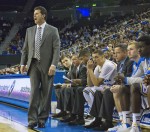For a team that predicates itself on its offensive firepower, the absence of much offense proved a novel concept for UCLA basketball over the weekend.
In a 69-56 victory at Colorado on Thursday and a 74-69 loss to Utah on Saturday, the Bruins shot 39.4 percent and 42.9 percent from the field, respectively, marking their second- and fifth-worst shooting performances of the season through 18 games.
The Bruins compensated for the lack of production on Thursday by applying relentless defensive pressure, forcing the Buffaloes into an 8-for-23 second half scoring dive that allowed UCLA to pull away and earn its third Pac-12 win of the season.
“I think we’re confident now as a team that we can shut down teams and not have to rely on outscoring teams, but that we can get stops on the defensive end,” said redshirt senior forward Travis Wear. “Hopefully that will help our transition a little more. It felt good to establish that defensive presence.”
UCLA likewise gave Utah very little breathing room on Saturday, forcing five turnovers in the final four minutes of the contest. The main issue was the other 36 minutes, in which the Bruins looked at times lost and unprepared for the Utes’ offensive attack.
Utah sophomore forward Jordan Loveridge beat UCLA beyond the arc and close to the rim for a team-high 17 points, and until a late-game push, the Bruins appeared on their heels.
Flight plan
Against the Utes, the Bruins were playing the back end of an undeniably tough road trip to two locations with very high elevation, but the origin of Saturday’s early – and persistent – flatness was explained in a number of different ways.
While coach Steve Alford mentioned he wasn’t pleased with his team’s shooting efforts in either game, he suggested after the Utah game that part of the problem might have rested with the team’s travel itinerary.
“In the guys’ defense, I wish we could’ve got here Thursday night, but that didn’t happen to maximize rest,” said Alford following the loss. “Our movement and our spacing wasn’t like it was. We watched a lot of tape on this road trip – tried to watch tape, we didn’t have a lot of time – but we tried to watch tape and show them that because I didn’t think our offense was very good at Colorado.”
UCLA’s Thursday game tipped off in Boulder at 6:06 p.m. local time and didn’t finish until around 8 p.m., forcing the team to catch a flight to Salt Lake City on Friday and, according to Alford, cut back on sleep and preparation time for Saturday’s matchup.
The road trip was the first of two regular-season conference slates in which the Bruins will be forced to play two games in three days on the road this season, the other coming on March 6 and March 8 when UCLA plays at Washington and Washington State, respectively.
“It’s part of the Pac-12 and everybody’s got to do it, we just wish we could’ve gotten out of (Boulder) Thursday night,” Alford said Saturday. “It’s the first time we’ve had that. We’ll learn from it and we’ve got to get that experience, but we weren’t as sharp to start this game as we were to start at Colorado.”
When asked about UCLA’s difficulty adjusting to the high-elevation environment on Saturday and whether it impacted the team’s early performance, freshman guard Zach LaVine offered a different explanation.
“I wouldn’t put that as an excuse,” LaVine said. “We just played at 5,000 feet in Colorado. We didn’t shoot the ball but played great defense and got out with a victory (against Colorado). We didn’t shoot the ball well (against Utah), didn’t play good defense and we came out with a loss.”
